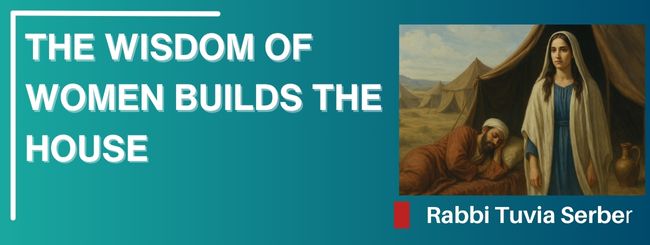בס”ד
Parashat Korach In this week’s Torah reading we find a rebellion organized by Korach, a cousin of Moshe and his friends. However, not all the people that started of the rebellion actually died. Why? the role of a woman in the house…
This week’s Torah reading is called korach — which is actually the name of one of the cousins of Moshe Rabbeinu, the leader of the Jewish people, and Aharon, of course, his brother.
Korachh started a whole rebellion against Moshe and Aharon. You can look up the verses in the Torah to see what happened. If you actually look at the names of the people who started the rebellion together with Korach, you’ll find that four names are mentioned: Korach, Datan, Aviram, and On ben Pelet. These four people initiated the rebellion. Later, 250 others joined, and the rebellion grew even larger.
But when the punishment for the rebellion is described and the story comes to an end, On ben Pelet is no longer mentioned. He disappears. What happened to him? Where did he go?
Our sages looked into this and offered a very interesting explanation. Through this explanation, we can discover the role of a true woman in Judaism — at least according to Jewish tradition.
Here’s the idea:
When Korach went home after Moshe Rabbeinu gave a series of instructions, Korach’s wife incited him. She pushed him, stirred him up, and encouraged him to rebel against Moshe. She told him that Moshe was keeping all the high-ranking roles in the leadership for himself and his brother, and that Korach was left with nothing. In other words, she inflamed his jealousy and ambition, and encouraged him to rebel. This eventually led to a full-scale revolt, affecting hundreds of people.
But On ben Pelet had a different kind of wife.
When he went home and told his wife what he was planning — to join Korach’s rebellion — she gave him a very different perspective. She said:
“Wait a second. If Moshe is in charge, you’re a follower. If Korach is in charge, you’re still a follower. What difference does it make for you who’s the leader? You’re not going to be in charge either way. So why get involved?”
She then gave him wine to drink, and he fell asleep. While he was sleeping, she sat outside their tent without a hair covering (something that, in that time and context, would discourage other men from approaching). When Korach’s men came looking for On, they saw her and turned back, unwilling to approach.
As a result, On ben Pelet never participated in the rebellion, and his life was spared.
On this, our sages bring a verse from Proverbs:
“The wisdom of a woman builds her home, but foolishness tears it down.”
We clearly see this idea:
- Korach’s wife, with her influence, destroyed her husband and their family, and contributed to the death of hundreds.
- On’s wife, through her wisdom and foresight, saved her husband — and their family — from destruction.
Now, together with this story, the Talmud brings an interesting statement. I’ll quote it in Hebrew and give a basic translation:
“Eizo hi isha tova? Ha’osah retzon ba’alah.”
“What is a good woman? One who does the will of her husband.”
At first glance, this seems a bit outdated — maybe even offensive. It sounds like the woman has no will of her own.
But now let’s look at this through a Chassidic lens, a deeper interpretation of the same words, just with a slight shift in reading.
“What is a good woman?”
“The one who makes the will of her husband.”
In other words, not someone who just follows, but someone who influences. A good woman understands deeply what the family needs — the children, the household, the husband. She uses her insight and wisdom to guide her husband and the entire home in the right direction.
So rather than simply obeying, she inspires. She shapes the values and direction of the household by aligning her husband’s will with the needs she sees with clarity and wisdom.
That’s the deeper message found in this week’s reading — even though it’s a sad story involving rebellion and death. It’s in this context that we see Judaism’s deep appreciation for the power of a wise woman, and how central she is to the strength and future of a Jewish home — and really, any home.
Talk from Rabbi Tuvia Serber
The above is a representation of the spoken text converted to written text.
© Copyright, all rights reserved. If you enjoyed this article, we encourage you to distribute it further.
Our blogs may contain text/quotes/references/links that include copyright material of
Mechon-Mamre.org, Aish.com, Sefaria.org, Chabad.org, and/or AskNoah.org, which we use in accordance with their policies.
